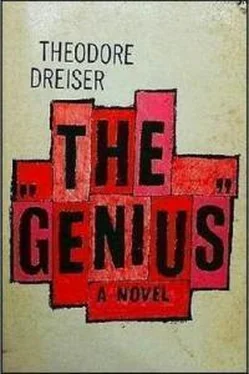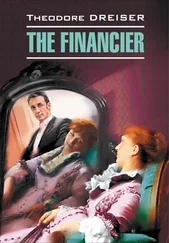Теодор Драйзер - The Genius
Здесь есть возможность читать онлайн «Теодор Драйзер - The Genius» весь текст электронной книги совершенно бесплатно (целиком полную версию без сокращений). В некоторых случаях можно слушать аудио, скачать через торрент в формате fb2 и присутствует краткое содержание. Год выпуска: 2014, Издательство: epubBooks Classics, Жанр: Классическая проза, на английском языке. Описание произведения, (предисловие) а так же отзывы посетителей доступны на портале библиотеки ЛибКат.
- Название:The Genius
- Автор:
- Издательство:epubBooks Classics
- Жанр:
- Год:2014
- ISBN:нет данных
- Рейтинг книги:4 / 5. Голосов: 1
-
Избранное:Добавить в избранное
- Отзывы:
-
Ваша оценка:
- 80
- 1
- 2
- 3
- 4
- 5
The Genius: краткое содержание, описание и аннотация
Предлагаем к чтению аннотацию, описание, краткое содержание или предисловие (зависит от того, что написал сам автор книги «The Genius»). Если вы не нашли необходимую информацию о книге — напишите в комментариях, мы постараемся отыскать её.
The Genius — читать онлайн бесплатно полную книгу (весь текст) целиком
Ниже представлен текст книги, разбитый по страницам. Система сохранения места последней прочитанной страницы, позволяет с удобством читать онлайн бесплатно книгу «The Genius», без необходимости каждый раз заново искать на чём Вы остановились. Поставьте закладку, и сможете в любой момент перейти на страницу, на которой закончили чтение.
Интервал:
Закладка:
"Yes," he said wearily. It was nearly morning. He went out and got into a taxi and went to his sister's home, but in spite of his weariness, he could scarcely sleep. He rolled feverishly.
In the morning he was up again, early, anxious to go back and see how Angela was—and the child.
Chapter XXVIII
The trouble with Angela's system, in addition to a weak heart, was that it was complicated at the time of her delivery by that peculiar manifestation of nervous distortion or convulsions known as eclampsia. Once in every five hundred cases (or at least such was the statistical calculation at the time), some such malady occurred to reduce the number of the newborn. In every two such terminations one mother also died, no matter what the anticipatory preparations were on the part of the most skilled surgeons. Though not caused by, it was diagnosed by, certain kidney changes. What Eugene had been spared while he was out in the hall was the sight of Angela staring, her mouth pulled to one side in a horrible grimace, her body bent back, canoe shape, the arms flexed, the fingers and thumbs bending over each other to and fro, in and out, slowly, not unlike a mechanical figure that is running down. Stupor and unconsciousness had immediately followed, and unless the child had been immediately brought into the world and the womb emptied, she and it would have died a horrible death. As it was she had no real strength to fight her way back to life and health. A Christian Science practitioner was trying to "realize her identity with good" for her, but she had no faith before and no consciousness now. She came to long enough to vomit terribly, and then sank into a fever. In it she talked of Eugene. She was in Blackwood, evidently, and wanted him to come back to her. He held her hand and cried, for he knew that there was never any recompense for that pain. What a dog he had been! He bit his lip and stared out of the window.
Once he said: "Oh, I'm no damned good! I should have died!"
That whole day passed without consciousness, and most of the night. At two in the morning Angela woke and asked to see the baby. The nurse brought it. Eugene held her hand. It was put down beside her, and she cried for joy, but it was a weak, soundless cry. Eugene cried also.
"It's a girl, isn't it?" she asked.
"Yes," said Eugene, and then, after a pause, "Angela, I want to tell you something. I'm so sorry, I'm ashamed. I want you to get well. I'll do better. Really I will." At the same time he was wondering, almost subconsciously, whether he would or no. Wouldn't it be all the same if she were really well—or worse?
She caressed his hand. "Don't cry," she said, "I'll be all right. I'm going to get well. We'll both do better. It's as much my fault as yours. I've been too hard." She worked at his fingers, but he only choked. His vocal cords hurt him.
"I'm so sorry. I'm so sorry," he finally managed to say.
The child was taken away after a little while and Angela was feverish again. She grew very weak, so weak that although she was conscious later, she could not speak. She tried to make some signs. Eugene, the nurse, Myrtle, understood. The baby. It was brought and held up before her. She smiled a weak, yearning smile and looked at Eugene. "I'll take care of her," he said, bending over her. He swore a great oath to himself. He would be decent—he would be clean henceforth and for ever. The child was put beside her for a little while, but she could not move. She sank steadily and died.
Eugene sat by the bed holding his head in his hands. So, he had his wish. She was really dead. Now he had been taught what it was to fly in the face of conscience, instinct, immutable law. He sat there an hour while Myrtle begged him to come away.
"Please, Eugene!" she said. "Please!"
"No, no," he replied. "Where shall I go? I am well enough here."
After a time he did go, however, wondering how he would adjust his life from now on. Who would take care of of―
"Angela" came the name to his mind. Yes, he would call her "Angela." He had heard someone say she was going to have pale yellow hair.
The rest of this story is a record of philosophic doubt and speculation and a gradual return to normality, his kind of normality—the artistic normality of which he was capable. He would—he thought—never again be the maundering sentimentalist and enthusiast, imagining perfection in every beautiful woman that he saw. Yet there was a period when, had Suzanne returned suddenly, all would have been as before between them, and even more so, despite his tremulousness of spirit, his speculative interest in Christian Science as a way out possibly, his sense of brutality, almost murder, in the case of Angela—for, the old attraction still gnawed at his vitals. Although he had Angela, junior, now to look after, and in a way to divert him,—a child whom he came speedily to delight in—his fortune to restore, and a sense of responsibility to that abstract thing, society or public opinion as represented by those he knew or who knew him, still there was this ache and this non–controllable sense of adventure which freedom to contract a new matrimonial alliance or build his life on the plan he schemed with Suzanne gave him. Suzanne! Suzanne!—how her face, her gestures, her voice, haunted him. Not Angela, for all the pathos of her tragic ending, but Suzanne. He thought of Angela often—those last hours in the hospital, her last commanding look which meant "please look after our child," and whenever he did so his vocal cords tightened as under the grip of a hand and his eyes threatened to overflow, but even so, and even then, that undertow, that mystic cord that seemed to pull from his solar plexus outward, was to Suzanne and to her only. Suzanne! Suzanne! Around her hair, the thought of her smile, her indescribable presence, was built all that substance of romance which he had hoped to enjoy and which now, in absence and probably final separation, glowed with a radiance which no doubt the reality could never have had.
"We are such stuff as dreams are made on and our little life is rounded with a sleep." We are such stuff as dreams are made on, and only of dreams are our keen, stinging realities compounded. Nothing else is so moving, so vital, so painful as a dream.
For a time that first spring and summer, while Myrtle looked after little Angela and Eugene went to live with her and her husband, he visited his old Christian Science practitioner, Mrs. Johns. He had not been much impressed with the result in Angela's case, but Myrtle explained the difficulty of the situation in a plausible way. He was in a terrific state of depression, and it was while he was so that Myrtle persuaded him to go again. She insisted that Mrs. Johns would overcome his morbid gloom, anyhow, and make him feel better. "You want to come out of this, Eugene," she pleaded. "You will never do anything until you do. You are a big man. Life isn't over. It's just begun. You're going to get well and strong again. Don't worry. Everything that is is for the best."
He went once, quarreling with himself for doing so, for in spite of his great shocks, or rather because of them, he had no faith in religious conclusions of any kind. Angela had not been saved. Why should he?
Still the metaphysical urge was something—it was so hard to suffer spiritually and not believe there was some way out. At times he hated Suzanne for her indifference. If ever she came back he would show her. There would be no feeble urgings and pleadings the next time. She had led him into this trap, knowing well what she was doing—for she was wise enough—and then had lightly deserted him. Was that the action of a large spirit? he asked himself. Would the wonderful something he thought he saw there be capable of that? Ah, those hours at Daleview—that one stinging encounter in Canada!—the night she danced with him so wonderfully!
Читать дальшеИнтервал:
Закладка:
Похожие книги на «The Genius»
Представляем Вашему вниманию похожие книги на «The Genius» списком для выбора. Мы отобрали схожую по названию и смыслу литературу в надежде предоставить читателям больше вариантов отыскать новые, интересные, ещё непрочитанные произведения.
Обсуждение, отзывы о книге «The Genius» и просто собственные мнения читателей. Оставьте ваши комментарии, напишите, что Вы думаете о произведении, его смысле или главных героях. Укажите что конкретно понравилось, а что нет, и почему Вы так считаете.









